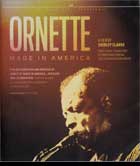
Ornette: Made in America 2014
Distributed by Oscilloscope Laboratores
Produced by Kathelin Hoffman
Directed by Shirley Clarke
DVD , color and b&w, 78 min., Blu-ray
College - General Adult
Music, African Americans
Date Entered: 12/15/2014
Reviewed by Brian Falato, University of South Florida Tampa Campus LibraryOrnette Coleman was one of the major creative forces in music during the second half of the 20th century. He first became famous for his improvisations on alto saxophone which dispensed with the usual method of improvising on chord changes. His 1960 album Free Jazz was subtitled “a collective improvisation,” and featured two quartets playing together and making up music on the spot for nearly 40 minutes. Later on, he wrote music for orchestra, such as The Skies of America, which also included an improvising jazz group. In 1983, Coleman returned to his hometown of Fort Worth, Texas to perform The Skies of America with his group Prime Time (including his son Denardo) and the Fort Worth Symphony Orchestra. Shirley Clarke’s documentary Ornette: Made in America, captures this performance, while using it as a springboard for other tangents about Coleman’s life and thoughts.
Those looking for a full chronology of Coleman’s life and work will not find it in this documentary. There is an assumption you already know about Coleman’s approach to music. And given that approach, it would have been incongruous for Clarke to use a traditional approach relating Coleman’s life story. We do get Coleman discussing his interest in space travel and Buckminster Fuller’s ideas (Coleman said he thought Fuller’s construction of geodesic domes matched his own approach to composition) and reminiscing about growing up in Fort Worth. We also get footage Clarke had shot in the 1960s of Coleman playing music with his then-12-year-old son, with his quartet in New York, and in Africa absorbing the indigenous music.
Clarke mixed film stock with video in the documentary and uses quick cutting, solarization, and paintbox techniques in an attempt to mirror the cutting-edge style of Coleman’s music. The overall effectiveness of these techniques can be debated, but they do provide an alternative to the “talking head” approach of documentary filmmaking.
Shirley Clarke died in 1997, having made only a handful of feature-length films. This DVD and Blu-ray release of Ornette: Made in America is part of Project Shirley, an effort by Milestone Films to restore her features and re-release them. The releases on video contain extra material, such as shorts, interviews with Clarke and others, and related material. As one of the few women directing feature films at the time, Clarke and her subjects have a historical importance. Libraries with large film studies collections should definitely acquire the Project Shirley titles, and those with large music collections will definitely want Ornette for the performance of The Skies of America and glimpses into its creator.